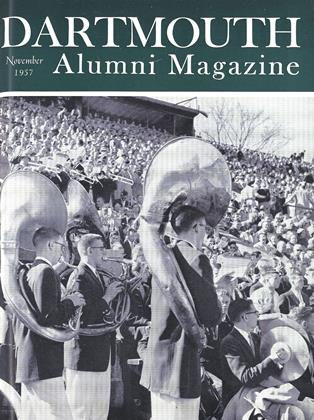By David A. Bradley '38. Hanover: Dartmouth Publications, 1957. $6.00.
John McLane Clark, Dartmouth '32, son of a Dartmouth man (John Alexander Clark '08) and nephew of John R. McLane '07, drowned in the swollen flood waters of the Sugar River at Claremont, New Hampshire, in late November 1950. The "journey" which David Bradley '38, author of No Place toHide, is describing is the forty years of growth of a man tied by extraordinary bonds of family and tradition and participation to Dartmouth College and clearly headed toward a brilliant career. But there is far more than Dartmouth in this moving, lively, and intimate account of John's personality and versatile life. This is also the story of youth's perennial search for meaning and pattern in this crazy-quilt world we all inhabit, of a host of perceptive impressions that will make every reader who has ever been young in heart recognize something of himself in John.
John Clark, writes David Bradley, "was born before the first War; he saw his father go off to a Plattsburg Captaincy and a humdrum assignment in Washington; he grew up during the twenties and went to college during the depression. As a newspaperman he learned his trade on a home-town weekly paper, and on the staff of the Washington Post, during the early experimentation of the New Deal. As an editorial writer for the Post, pausing daily to make comment on some recent event, he was like a medical corpsman patching the blisters of a world marching to its second War. Later he worked with John Winant in the International Labor Office of the League of Nations, with Nelson Rockefeller in the Office of the Coordinator for Inter-American Affairs, with Donovan and Dulles in OSS. After the war he returned to the region and vocation of his choice, publishing the Daily Eagle in Claremont, New Hampshire. All this, and much more, he brought home with him, and gave to his mill town paper and its sequestered New England community."
For every Dartmouth man there is much in Journey which will stir responses, revive old memories, give new insights into the world of Dartmouth. Every reader will thank David Bradley for allowing John to tell the story of his own life - through his editorials, through his articles, through his remarkable personal correspondence. The author sets the stage, provides the framework, gives us vignettes through recollections and impressions of those who knew John best but keeps himself in the background. He seldom intrudes the distorting refractions of personal interpretation between John Clark and the reader.
So we see John's family and boyhood, his life at St. Paul's and Dartmouth, in large part through his own eyes. Then post-1932 graduation years as publisher of the weekly New Canaan Gazette. Four exciting years in New Deal Washington under Felix Morley on the Washington Post. Laying newspaper ing aside for seven years of pre-war and wartime service with Winant, Nelson Rockefeller, General Donovan (plus a hitch of basic training after his enlistment in 1943). Giving up post-war dreams of having a try at the Pacific Northwest, and settling instead for "trying to fight it out on a North of Boston line." His adventures in trying to create a newspaper in his own image in Claremont conclude the book - and the brief remaining years left to John Clark who "was very much a man of our times. He saw what we all have seen, only with somewhat clearer eyes; he wrote as we might have written, only with a more gifted pen. In preserving some of his best writings we will find that we are preserving some of the best in us."
 View Full Issue
View Full Issue
More From This Issue
-
 Feature
FeatureHanover in the Ice Age
November 1957 By RICHARD J. LOUGEE '27 -
 Feature
FeatureBeyond Independence: Creativity
November 1957 -
 Feature
FeatureGlass Funds and the Capital Campaign
November 1957 -
 Feature
FeatureClub Officers Form Association
November 1957 -
 Class Notes
Class Notes1918
November 1957 By ERNEST H. EARLEY, W. CURTIS GLOVER, RICHARD P. WHITE -
 Class Notes
Class Notes1916
November 1957 By WILLIAM L. CLEAVES, F. STIRLING WILSON, RODERIQUE F. SOULE1 more ...
HOWLAND H. SARGEANT '32
Books
-
 Books
BooksSECOND WIFE.
DECEMBER 1963 By CLIFF JORDAN '45 -
 Books
BooksBEAU-POIL AU MAROC
June 1940 By F. Cudworth Flint -
 Books
BooksA BRIEF HISTORY OF MEDICINE IN MASSACHUSETTS.
MARCH 1931 By Frederic P. Lord -
 Books
BooksAS A CITY UPON A HILL.
FEBRUARY 1967 By HERBERT W. HILL -
 Books
BooksStreamside Delights
MAY 1983 By Kenneth E. Shewmaker -
 Books
BooksARKANSAS ADIOS.
JANUARY 1972 By SAMUEL F. PICKERING JR.


